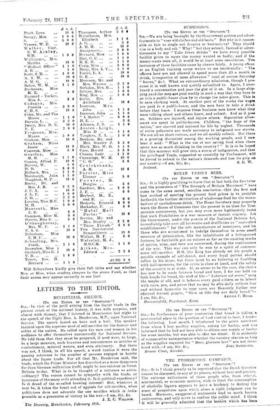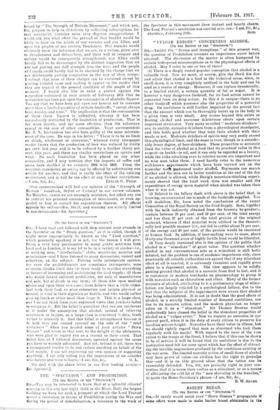THE PROHIBITION CAMPAIGN.
[To Tits EDITOR Or THE " SPECTATOR.") Stn,--It is I think greatly to be regretted Out the Drink Question cannot be discussed, in any of its phases, without heat and passion. The extreme enthusiasm of those people who, from ethical, sentimental, or economic motives, wish to limit the consumption of alcoholic liquors appears to have a tendency to destroy the sense of proportion upon which alone a right judgment can be based. Moreover, exaggerated statements lead to much barren controversy, and only serve to confuse the public mind. I think it will be generally admitted that the booklet which has been issued by " The Strength of Britain Movement," and which you, sir, propose to help to distribute by collecting subscriptions for that movement, contains some very flagrant exaggerations. I would ask you what effect the perusal of that booklet would be likely to have on the minds of our enemies and our Allies, and upon the peoples of our oversee Dominions. Our enemies would obviously draw the inference that we are, as a nation, given over to drunkenness and debauchery, and their will to conquer and endure would be consequently strengthened; our Allies could hardly fail to be discouraged by the distinct suggestion that we are not putting our full strength into the war; and the people Of Canada could hardly fail to he alarmed by the charge that we are deliberately putting temptation in the way of their troops.
I submit that none of these charges can be sustained except by quoting isolated cases and making it appear to the reader that they are typical of the general condition of the people of this country. I would also like to enter a protest against the suggestion contained in your article of February 10th that no restriction has been put upon the consumption of alcoholic liquors. You say that we have been put upon our honour not to consume more than a limited quantity of certain foodstuffs, " except always beer, whisky, and wine." The implication is that the consumption of these three liquors is unlimited, whereas it has been compulsorily restricted by the limitation of production. That is far more drastic, and far more effective, than the voluntary appeal in the ease Of other commodities. Your correspondent Mr. J. N. Richardson has also been guilty of the same misstate- ment of the ease. He says in his letter : " There is to be no limit en drink, wholesome or otherwise," whereas every newspaper render knows that the production of beer was reduced by thirty per cent. last year and is to be reduced by a further thirty per cent. this year, and there are similar restrictions on spirits and wine. No such limitation has been placed on any other commodity, and I may mention that the imports of coffee and cocoa have doubled if we compare • 191G with 1913. From the economic standpoint.no saviee can be effected by substituting one article for another, and that is really tho effect of the existing restrictions, and it will be the effect of any further restrictions.
[Our correspondent will find our opinion of the " Strength of Britain " handbook, Defeat or Fictoryl in our review columns. No Minister, unless we are strangely mistaken, has asked any one to restrict his personal consumption of intoxicants, or even ap- pealed to him to curtail his expenditure thereon. All official appeals for self-sacrifice, thrift, and economy are strictly limited to non-intoxicants.—Ea. Spectator.]







































 Previous page
Previous page